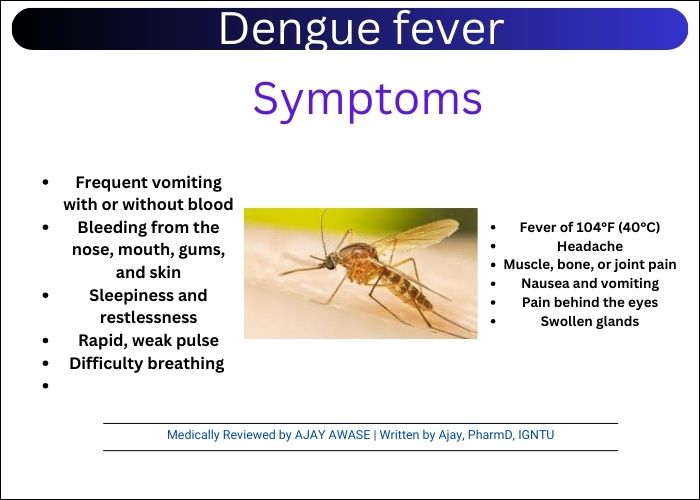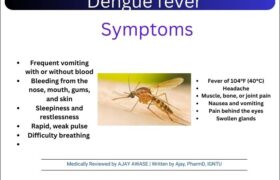Dengue Fever
Medically Reviewed by AJAY AWASE | Written by Ajay, PharmD, IGNTU
A virus called dengue fever is commonly found in tropical and subtropical regions and is transmitted by mosquitoes. There are four distinct varieties of dengue virus that cause illness, and having one infection does not make you immune to the others. Pill Recognizer

Symptoms: Dengue Fever
- High fever
- Severe headache
- Pain behind the eyes
- Muscle and joint pain
- Nausea and vomiting
- Rash
- Bleeding gums or nose
- Fatigue
Severe Dengue:
Severe dengue, commonly referred to as dengue hemorrhagic fever or dengue shock syndrome, can occur in a tiny proportion of cases. This is a potentially fatal illness that can cause organ failure, internal haemorrhage, and even death.
Treatment:Dengue fever has no specific therapy. The goal is to control the symptoms and avoid further issues. Rest, water, and painkillers are usually part of the treatment. Hospitalisaltion could be required for treatment and monitoring in extreme situations.Pill Recognizer
Prevention:
The best way to prevent dengue fever is to avoid mosquito bites. This can be done by:
- Using mosquito repellent
- Wearing long sleeves and pants
- Sleeping under mosquito nets
- Eliminating breeding grounds for mosquitoes, such as stagnant water
A dengue vaccine is available in some countries, but its effectiveness varies. Pill Recognizer
If you are experiencing symptoms of dengue fever, it is important to seek medical attention immediately.
Dengue fever is a mosquito-borne viral infection that can cause a range of symptoms. Here are some of the most common symptoms of dengue fever:
- High fever: This is often the first symptom to appear.
- Severe headache: The headache is often behind the eyes.
- Pain behind the eyes: This pain can be quite severe.
- Muscle and joint pain: The pain can be aching or throbbing.
- Nausea and vomiting: These symptoms are common.
- Rash: The rash usually appears a few days after the fever starts. It can be red, flat, and itchy.
- Bleeding gums or nose: Bleeding can be a sign of severe dengue.
- Fatigue: Dengue can cause extreme fatigue.Pill Recognizer
Dengue Tests

Dengue fever can be diagnosed using a variety of assays. These examinations may be carried out at a lab or medical facility. Here are a few typical techniques:Pill Recognizer
- NS1 Test: This quick antigen test finds the dengue virus’s non-structural protein 1 (NS1) in blood. When the disease is still in its initial week, it can be utilised to identify dengue fever.
- IgM and IgG Antibody Tests: These assays identify antibodies that the body makes in reaction to the dengue virus. After infection, IgG antibodies take longer to develop and might last for years, but IgM antibodies show symptoms within a few days.
- Polymerase Chain Reaction (PCR): This molecular test finds the dengue virus’s genetic material in the blood. Because of its high sensitivity, dengue fever can be identified in its early stages of sickness.
When to Get Tested:Pill Recognizer
It’s critical to get medical assistance and get tested if you have any of the following symptoms of dengue fever: high fever, intense headache, discomfort behind the eyes, joint and muscular pain, nausea, vomiting, rash, bleeding gums or nose, and exhaustion.
Note: Early diagnosis and treatment are crucial for preventing severe complications of dengue fever.
Dengue Treatment
Dengue fever has no specific therapy. The goal is to control the symptoms and avoid further issues. The following are a few typical therapies:
- Rest: Getting plenty of rest is important for recovery.
- Fluids: Drinking plenty of fluids is essential to prevent dehydration.
- Pain relievers: Acetaminophen (paracetamol), an over-the-counter pain medication, can help reduce fever and pain. Ibuprofen and aspirin should be avoided as they raise the risk of bleeding.
- Monitoring: It’s crucial to keep a careful eye on your health if you have dengue fever, especially for any indications of a severe case. These symptoms include black faece, blood in the vomit, or bleeding gums or nose.
- Hospitalization: Hospitalisation may be required for monitoring and treatment in severe dengue patients. This could involve blood transfusions, supportive care, and intravenous fluids.
It’s crucial to seek medical attention promptly if you suspect you have dengue fever, especially if you experience any signs of severe illness.Pill Recognizer
Note: While there is no specific antiviral medication for dengue, some research is being conducted on potential treatments.
Dengue Vaccine
There is a dengue vaccine available, but its effectiveness and availability vary depending on the country. The vaccine is called DEN-1-4.
Key points about the dengue vaccine:
- Effectiveness: When it comes to avoiding hospitalisation and severe dengue, the dengue vaccine works best. However, depending on the dengue virus serotype that is active in the area, its efficacy may vary.
- Age restrictions: The suggested age range for the dengue vaccine is normally 9 to 45 years old.
- Multiple doses: The vaccine requires multiple doses over a period of time to be effective.
- Not suitable for everyone: It is not advised for pregnant women, those with severe dengue, or those with specific medical conditions to receive the dengue vaccination.Pill Recognizer
If you are considering getting the dengue vaccine, it’s important to consult with a healthcare professional to discuss the risks and benefits.
Remember: You should continue take preventive measures to avoid mosquito bites even if you have had the vaccination. Some of them include wearing long sleeves and trousers, applying insect repellent and avoiding locations with standing water.
Blood Tests
There are several blood tests that can be used to diagnose dengue fever. These tests can help determine if you have been infected with the dengue virus and the stage of the infection.
Here are some common dengue blood tests:Pill Recognizer
- NS1 test: This test finds the dengue virus’s non-structural protein 1 (NS1) in your blood. When the sickness is in its initial week, it is most accurate.
- IgM antibody test: This test looks for IgM antibodies, which your body produces in reaction to the dengue virus. After infection, IgM antibodies start to show up a few days later and can last for several weeks.
- IgG antibody test: This test looks for IgG antibodies, which your body also produces in reaction to the dengue virus. IgG antibodies can last for years and develop later in the infection.
- Polymerase chain reaction (PCR) test: This test finds the dengue virus’s genetic material in your blood. During the first week of illness, it is most accurate.
It’s critical to get a dengue test from a doctor if you exhibit signs of dengue fever, such as a high fever, intense headache, discomfort behind the eyes, joint and muscular pain, nausea, vomiting, rash, bleeding gums or nose, and exhaustion.
Dengue mosquitoes
Dengue mosquitoes are primarily Aedes aegypti and Aedes albopictus. These mosquitoes are well-known for their propensity to bite during the day and for having black and white stripes on their bodies. They frequently reproduce in flowerpots, buckets, and other containers with standing water.Pill Recognizer
Key characteristics of dengue mosquitoes:
- Daytime feeders: Dengue mosquitoes are active throughout the day, in contrast to malaria insects, which usually bite at night.
- Stagnant water breeding: They breed in small pools of stagnant water, such as in containers, buckets, tires, and flowerpots.Pill Recognizer
- Aggressive biters: Aggressive biters, dengue mosquitoes have little trouble penetrating clothing.
Preventing dengue mosquito bites:
- Use mosquito repellent containing DEET or other effective ingredients.
- When it’s daytime, especially, wear long sleeves and trousers.
- Sleep under mosquito nets.
- Get rid of any standing water near your house and neighbourhood.
- Support community efforts to control mosquito populations.
By taking these precautions, you can help reduce your risk of dengue fever.
Dengue Fever Medications
Dengvaxia – The risk of dengue is decreased by dengue vaccine. Dengue is not treated by it. Even with this vaccination, dengue can still occur, however the illness may not cause as many symptoms or persist as long. It functions by teaching your immune system how to fend off infections in the future.
Mosquito Prevention
Here are some effective ways to lower your chances of getting dengue fever:
Mosquito Prevention:
- Use mosquito repellent: Apply insect repellent containing DEET, picaridin, or other effective ingredients to your skin and clothing.
- Wear protective clothing: Wear long sleeves and trousers to protect your arms and legs from mosquitoes, especially during the day when they are most active.
- Sleep under mosquito nets: Use treated mosquito nets to protect yourself while sleeping.
- Avoid outdoor activities during peak mosquito hours: Avoid going outside in the early morning and late afternoon when mosquitoes are most active, if at all feasible.Pill Recognizer
Environmental Control:
- Eliminate stagnant water: Mosquitoes procreate in still water. Empty or clean containers—such as buckets, flowerpots, and abandoned tires—that may retain water on a regular basis.
- Cover water storage containers: To stop mosquitoes from laying their eggs, make sure that drums and other water storage containers are securely covered.
- Maintain your yard: Maintain a tidy garden free of any debris that could serve as a mosquito breeding habitat.Pill Recognizer
Vaccination:
- Consult with a healthcare provider: Talk to your doctor about the advantages and disadvantages of the dengue vaccination if it’s offered in your area. For people who reside in or plan to visit regions with high dengue transmission rates, it might be advised.
Remember: Dengue fever can still strike, despite your best efforts. Seek medical assistance right once if you suffer symptoms such as a high temperature, intense headache, pain behind the eyes, joint and muscular pain, nausea, vomiting, rash, bleeding gums or nose, and exhaustion.Pill Recognizer


Leave a Reply